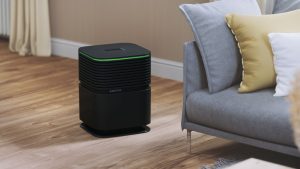As summer temperatures climb, you may face a familiar dilemma — should you open your windows to enjoy fresh air or keep them closed to maintain comfortable indoor temperatures? This choice becomes particularly challenging when you’re concerned about how to improve indoor air quality during the hottest months of the year. With rising temperatures come unique air quality challenges that affect both your comfort and health. Explore solutions that can help you maintain optimal indoor air even when summer heat forces windows shut.
The Summer Air Quality Challenge
When temperatures soar, the quality of air outside and inside your home undergoes significant changes. Summer indoor humidity levels typically rise, creating an environment where dust mites, mold, and other allergens thrive. According to the Environmental Protection Agency, indoor air can be far more polluted than outdoor air.
Urban dwellers face additional challenges. You’re not alone if you’re wondering how to improve air quality in cities. Urban areas experience what scientists call the heat island effect, where concrete and buildings absorb and radiate heat, intensifying local temperatures and trapping pollutants. This means urban dwellers must be especially strategic.
The dilemma intensifies when you consider that approximately a third of all Americans routinely breathe unhealthy air, making proper indoor air management an issue of comfort and health.
The Open Window Challenge
While open windows provide natural ventilation and light — which can improve your vitamin D levels and lead to better sleep — they can also let in outdoor pollutants, allergens, and excess humidity, especially during the hottest part of the day. A brief period of ventilation in the morning and evening, when pollution levels may be lower, can help. Still, during much of the summer, alternative solutions are necessary for maintaining healthy indoor air.
Effective Technology Solutions for Summer Indoor Air Quality

When outdoor conditions make open windows impractical, there are three primary solutions to maintain optimal indoor air quality:
1. Airwashers
Airwashers represent a revolutionary approach to indoor air management during the summer months. Unlike air conditioners, an airwasher doesn’t cool the air. Instead, it simultaneously humidifies while cleaning the air using a hygienic, natural method of evaporative humidification. It hydrates your air while ridding it of indoor air pollutants using a HEPA filter.
How airwashers improve your summer indoor experience:
- Optimal humidity maintenance: Airwashers maintain the ideal humidity range to discourage mold growth and excessive dryness.
- Pollutant removal: Their advanced filtration systems, Airwashers capture dust, pollen, pet dander, and other microscopic particles that typically increase during summer.
- Natural process: Using evaporative technology rather than mist or steam, airwashers humidify without creating conditions for bacterial growth.
The unique cold evaporation process used in quality Airwashers eliminates more particulate matter, making them exceptionally efficient at maintaining clean air when summer conditions require closed windows.
2. Humidifiers
Many associate summer with humidity. However, air conditioning systems often strip moisture from indoor air, creating artificially dry environments. Summer indoor humidity management requires understanding this effect.
Modern humidifiers offer targeted solutions, including:
- Reduced dryness: By reintroducing moisture to air-conditioned spaces, humidifiers help maintain respiratory comfort and prevent dry skin, eyes, and nasal passages.
- Dust control: Properly humidified air causes dust particles to become heavier and settle rather than remain airborne.
- Sleep enhancement: Maintaining optimal humidity levels and air quality in bedrooms improves sleep during hot summer nights.
Research indicates that keeping indoor humidity between 40-60% reduces the survival rate of airborne viruses and bacteria while improving overall respiratory function. This is particularly important during summer when allergies and asthma symptoms often intensify.
3. Air Purifiers
As a complementary solution to Airwashers and humidifiers, air purifiers offer specialized filtration for summer air challenges.
- Allergen capture: HEPA filtration systems in quality air purifiers can trap tiny allergens.
- Smoke and volatile organic compound filtration: This is particularly valuable during wildfire season or in urban environments, where improving air quality in cities becomes a pressing concern.
- Bedroom and small space solutions: Compact air purifiers provide targeted filtration in spaces where you spend the most time.
Creating an Air Quality Strategy for Summer

The most effective approach combines these three technologies based on your specific situation. Take the following steps for improved indoor air quality during the summer:
- Start with an Airwasher. As the most comprehensive solution, an airwasher should form the foundation of your summer air quality strategy, providing both humidification and filtration in one efficient device.
- Supplement with targeted humidifiers. Place additional humidifiers in bedrooms or other key spaces where air conditioning runs frequently to maintain consistent humidity levels throughout your home.
- Add air purifiers for specialized needs. Consider air purifiers with activated carbon filters for rooms that may have additional odors or chemical concerns, such as kitchens or home offices with electronics.
- Implement smart technology. Many modern air quality devices connect to smartphone apps that allow you to monitor and adjust settings remotely, ensuring optimal performance even when you’re away.
Enjoying Summer Breezes Without Compromising Your Indoor Air
By implementing a technology-focused strategy, you can enjoy clean, properly humidified air throughout the summer without relying solely on open windows. Investing in quality air treatment devices improves overall comfort during the most challenging season for indoor air quality.
Remember that improving indoor air quality during summer is essential to maintaining your overall health and well-being throughout the hottest months and beyond.

